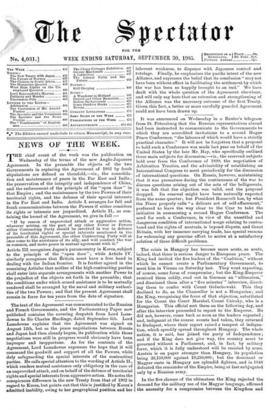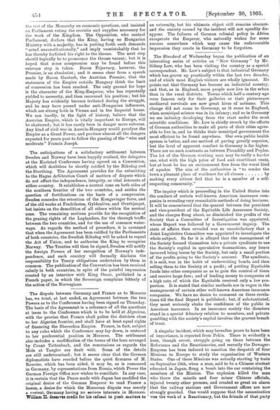the rest of the Monarchy on economic questions, and insisted
on Parliament voting the recruits and supplies necessary for- the work of the Kingdom. The Opposition, who control Parliament, declare that the King, having no Hungarian Ministry with a majority, has in. putting forth such demands " acted unconstitutionally," and imply unmistakably that he has thereby forfeited his right to the throne. The next step should logically be to pronounce the throne vacant; but it is hoped that some compromise may be found before this extreme step is taken. Baron Fejervary, however, the Premier, is an absolutist; and it seems clear from a speech made by Baron Gautscb, the Austrian Premier, that the statesmen of the Empire outside Hungary think the limit of concession has been reached. The only ground for hope is the character of the King-Emperor, who has repeatedly yielded to necessity, and then recovered his position ; but his Majesty has evidently become irritated during the struggle, and he may have passed under anti-Hungarian influences, which are strong both in Vienna and in the Imperial house. We can hardly, in the light of history, believe that the Austrian Empire, which is vitally important to Europe, will be shattered ; but it has rarely been in danger more extreme. Any kind of civil war in Austria-Hungary would paralyse the Empire as a Great Power, and produce almost all the dangers expected for years past to follow the passing of the "wise and moderate" Francis Joseph.











































 Previous page
Previous page